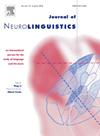Some complications with neurolinguistic research on unaccusativity
IF 1.2
3区 心理学
Q2 LINGUISTICS
引用次数: 0
Abstract
Two classes of intransitive verbs involve different syntactic-semantic linking patterns. Unergative verbs follow the canonical pattern because the subject noun-phrase (NP) expresses the actor of the described event (e.g., The boy ran), whereas unaccusative verbs have a noncanonical pattern because the subject NP expresses the undergoer of the described event (e.g., The boy fell). Many neurolinguistic studies suggest that, compared to unergative verbs, unaccusative ones are harder to process. After summarizing this literature, I point out two complications with it. First, a large proportion of the researchers unjustifiably assume a Chomskyan analysis of unaccusative verbs whereby the NP linked with the undergoer role is an underlying direct object that must be moved to the subject position. Second, most of the studies ignore several important aspects of unaccusativity, including problems with putative syntactic diagnostics and extensive crosslinguistic diversity that is nonetheless semantically constrained.
神经语言学非宾格性研究中的一些问题
两类不及物动词具有不同的句法语义连接模式。非否定动词遵循规范模式,因为主语名词短语(NP)表达了所描述事件的行动者(例如,男孩跑了),而非宾格动词具有非规范模式,因为主语NP表达了所描述事件的经历者(例如,男孩摔倒了)。许多神经语言学研究表明,与非否定动词相比,非宾格动词更难处理。在总结了这些文献之后,我指出了它的两个复杂之处。首先,很大一部分研究者不合理地假设了乔姆斯基式的非宾格动词分析,即与经历者角色相连的NP是一个必须移动到主语位置的潜在直接宾语。其次,大多数研究忽略了非宾格性的几个重要方面,包括假定的句法诊断问题和广泛的跨语言多样性问题,尽管如此,这些问题在语义上受到限制。
本文章由计算机程序翻译,如有差异,请以英文原文为准。
求助全文
约1分钟内获得全文
求助全文
来源期刊

Journal of Neurolinguistics
医学-神经科学
CiteScore
3.90
自引率
5.00%
发文量
49
审稿时长
17.2 weeks
期刊介绍:
The Journal of Neurolinguistics is an international forum for the integration of the neurosciences and language sciences. JNL provides for rapid publication of novel, peer-reviewed research into the interaction between language, communication and brain processes. The focus is on rigorous studies of an empirical or theoretical nature and which make an original contribution to our knowledge about the involvement of the nervous system in communication and its breakdowns. Contributions from neurology, communication disorders, linguistics, neuropsychology and cognitive science in general are welcome. Published articles will typically address issues relating some aspect of language or speech function to its neurological substrates with clear theoretical import. Interdisciplinary work on any aspect of the biological foundations of language and its disorders resulting from brain damage is encouraged. Studies of normal subjects, with clear reference to brain functions, are appropriate. Group-studies on well defined samples and case studies with well documented lesion or nervous system dysfunction are acceptable. The journal is open to empirical reports and review articles. Special issues on aspects of the relation between language and the structure and function of the nervous system are also welcome.
 求助内容:
求助内容: 应助结果提醒方式:
应助结果提醒方式:


